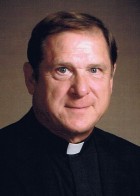Asking ‘How do readings challenge me?’ reveals food for thought — and faith

Father R. Michael Schaab
By Father R. Michael Schaab
Second Sunday in Ordinary Time/Jan. 15
Isaiah 49:3,5-6; Psalm 40:2,4,7-8,8-9,10; 1 Corinthians 1:1-3; John 1:29-34
Rather than using this column solely to explain the meaning of the readings for the next couple Sundays, I would like to also address “how” a person comes to an understanding of the Scriptures assigned to a certain Sunday Eucharist. Of course, one can spend a couple hours researching the readings, or one can enter into a conversation with others about the readings in order to come to some consensus about the meaning. But there is yet a third way of ascertaining at least a general appreciation for the message of the Scriptures readings. I discovered this method in the mist of traveling.
While traveling I have a habit of getting to the church I’m visiting at least 20 minutes before the beginning of the weekend liturgy. I used to do this only while traveling outside the United States but in the recent past I’ve begun to do this while traveling within our own country. The reason for this practice is to prepare myself for the possibility of participating in the celebration of the Eucharist in a language other than my mother tongue.
During those 20 minutes I refer to either a Missalette in the pew or my own pocket English Lectionary to read over the readings of the day. The purpose of this is not only to familiarize myself with the Scripture readings for that particular Mass but to prepare myself to preach a sermon. Now, I don’t mean that I’m preparing myself to take over the pulpit. Rather, I have to have enough familiarity with the readings that I’ll be able to intelligently reflect on them quietly in my own mind, and in my own language, while the presiding priest or deacon is preaching in his language. In those moments before Mass I read the Scriptures of the day to discover the core message they have for me. I ask a simple question as I read: “How do these readings challenge me?”
I have to admit that in trying to understand the readings it helps, in a couple ways, if one has a sense of the liturgical year, since the readings have been selected by the Church to coincide with this year. For instance, as the Christmas-Epiphany season comes to an end we know that the readings will begin to follow the development of the ministry of Jesus as a mature preacher and teacher in Galilee. Normally, the transition from the birth of Jesus to the ministry of Jesus is marked by the Feast of the Baptism of the Lord on the Sunday after the Epiphany.
However, with Christmas falling on a Sunday this year, feast days have been realigned so that the Baptism of the Lord was actually celebrated on a Monday, Jan. 9. Nevertheless, we should be prepared for the Scripture readings for the next couple Sundays, Jan. 15 and 22, to focus on the early days of Jesus’ ministry. Furthermore, having a sense of the liturgical year is beneficial because it provides a knowledge of the signs, symbols and themes that are part of our worship.
BAPTISMAL PROMISE, CHALLENGE
The Gospel for Jan. 15 records John the Baptist’s reflections concerning his baptism of Jesus. It is part of his profession of faith in the Word made flesh. We ourselves profess our faith weekly at Mass, so John the Baptist’s reflections are really not all that challenging to us. However, if we look at the other readings in the light of our own baptism, then we begin to discover the challenge they hold.
We have been baptized into Christ and we have been “called to be holy.” We have been called to do God’s will. We have been commissioned to announce God’s “justice in the vast assembly.” Through our baptism we share in the light of Christ and are called to be a “light to the nations.” Finally, if all of this is not challenging enough, because of the sacrament of baptism we are not simply given the title, “a child of God,” we are given the “power to become children of God.” And, what have I done with that “power?”
The readings for Jan. 22 continue to challenge us with our own baptism. Light is a major theme. We were presented with a candle at baptism and told to “receive the light of Christ.” Do I let my light shine on those who are burdened? Do I allow my light to make me stouthearted and to take away all my fears? Do I hold on to my light even when I’m “overshadowed by death?” And, finally, do I allow that light to really unite me with my brothers and sisters who share the mind of Christ?
You may find, as I often do, that asking, “How do these readings challenge me?” as I pick up the Scriptures gives me enough to think about not only on Sunday but throughout the whole week.
—–
Father R. Michael Schaab is a senior priest of the Diocese of Peoria who gives retreats and days of recollection, and who fills in as presider at parish Masses on weekends. He resides on a hobby farm in Putnam County.





